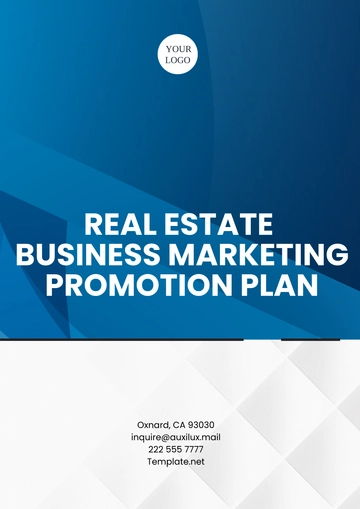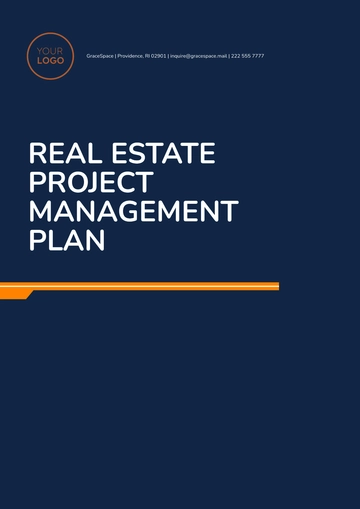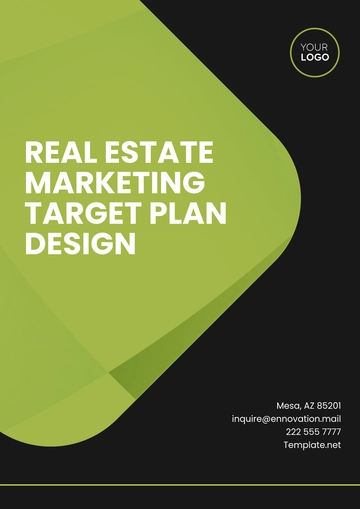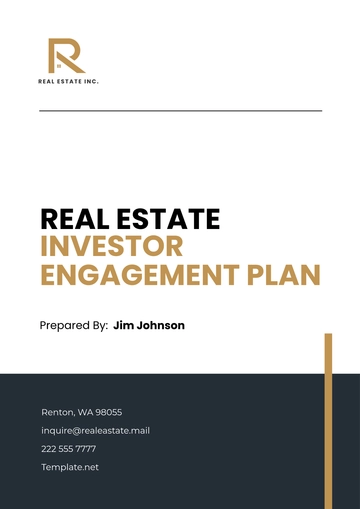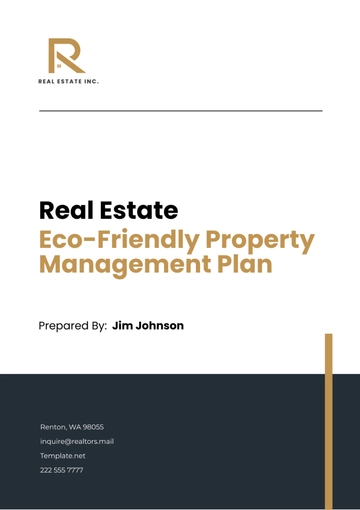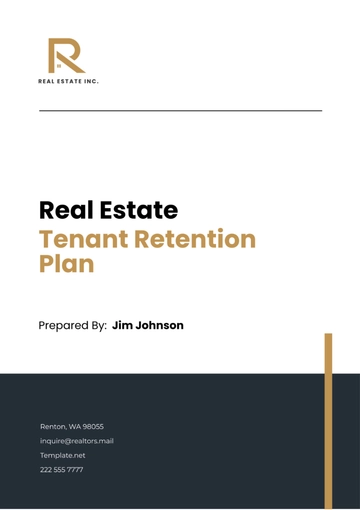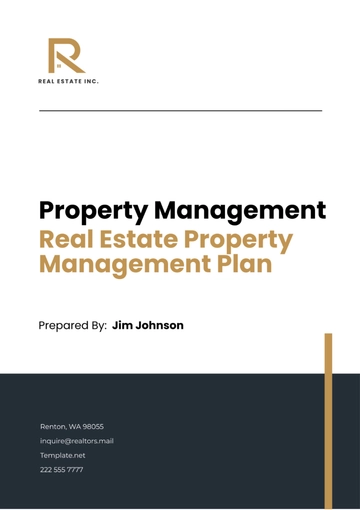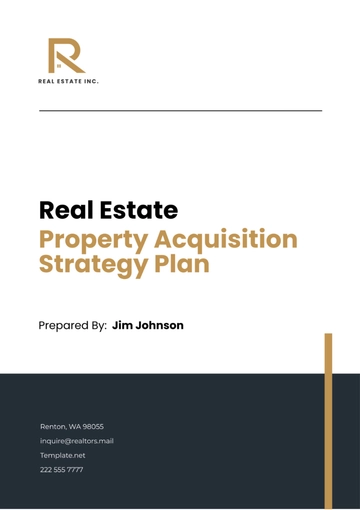Free Real Estate Business Marketing Promotion Plan
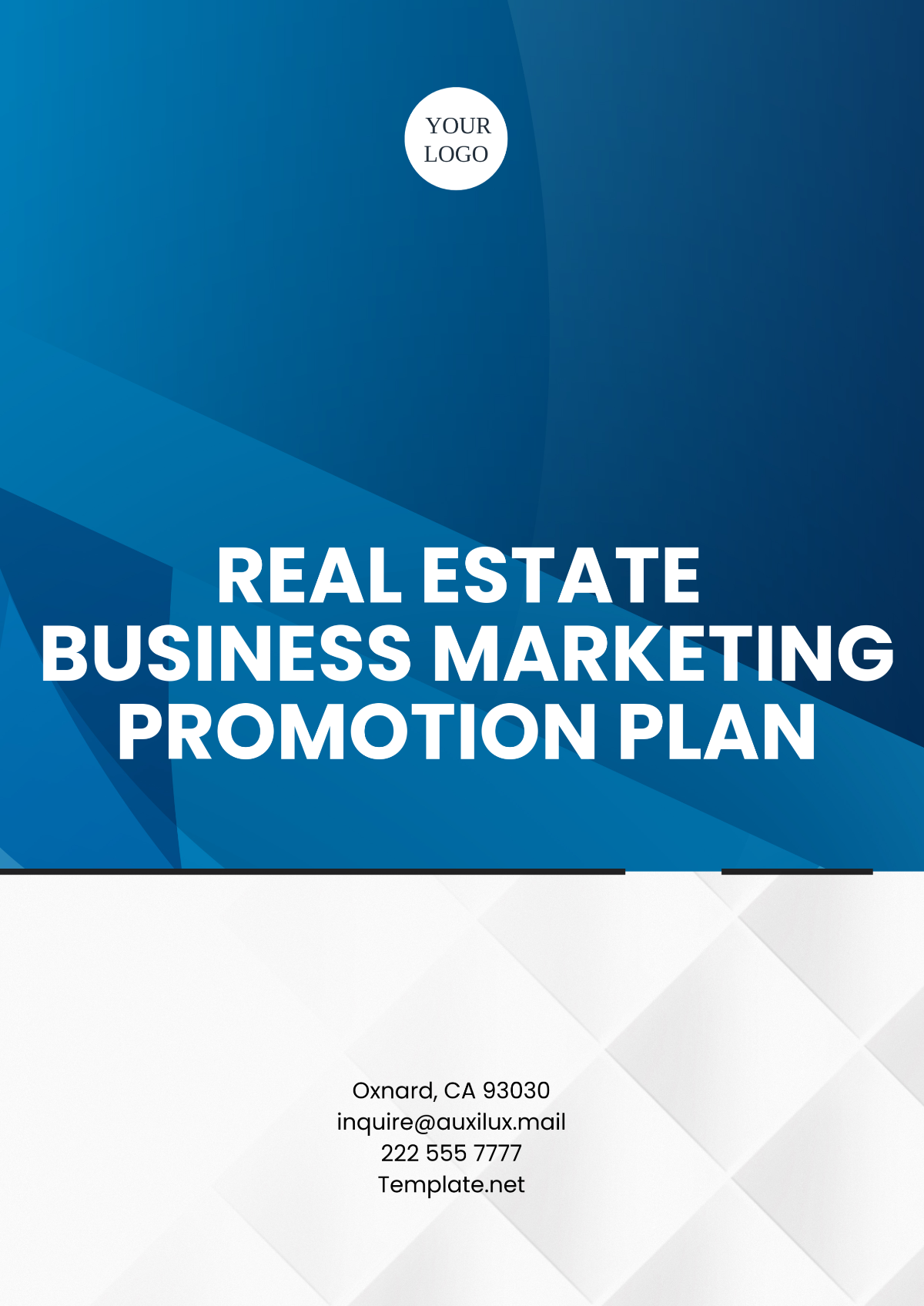
Prepared by:
[YOUR NAME]
[YOUR COMPANY NAME]
Executive Summary
This marketing promotion plan outlines a comprehensive strategy to enhance the visibility, lead generation, and sales performance of our real estate business. By leveraging a mix of digital and traditional marketing techniques, this plan aims to position the company as a trusted name in the competitive real estate market. Key objectives include boosting brand awareness, fostering client relationships, and increasing conversion rates through optimized marketing efforts and continuous evaluation.
Market Analysis
The real estate market is highly dynamic, influenced by factors such as economic conditions, shifting consumer preferences, and technological advancements. A detailed analysis has identified the following key trends:
Growing demand for sustainable and energy-efficient properties.
Increased interest in suburban homes due to remote work trends.
Digital platforms as a primary tool for property discovery and transactions.
Competitive Landscape
The industry comprises large agencies with expansive portfolios, boutique firms catering to niche markets, and tech-driven startups. Differentiation will focus on delivering personalized service, utilizing in-depth market insights, and adopting innovative marketing approaches.
Target Audience
Our primary target audience includes:
First-Time Homebuyers: Seeking affordability, location convenience, and financing options.
Real Estate Investors: Focused on high ROI, market stability, and long-term property appreciation.
Downsizers: Looking for low-maintenance properties that align with changing lifestyles.
Behavior and Preferences
Digital Engagement: Rely on online listings, virtual tours, and reviews.
Decision-Making: Influenced by market trends, transparency, and reputation.
Marketing Objectives
Increase brand awareness: Achieve a 30% growth in brand recognition within 12 months.
Generate qualified leads: Secure 500 high-quality leads monthly through online platforms.
Enhance conversion rates: Improve sales funnel efficiency by 20% within six months.
Marketing Strategies
Digital Marketing
Search Engine Optimization (SEO):
Optimize web pages for high-ranking keywords like "homes for sale near me" and "real estate investments."
Boost local SEO efforts to dominate regional searches with optimized Google My Business profiles.
Build backlinks from authoritative real estate platforms.
Content Marketing:
Publish weekly blog posts on market trends, property-buying tips, and success stories.
Create professional video tours for featured properties.
Share infographics summarizing property data and investment benefits.
Social Media Advertising:
Launch targeted campaigns on Facebook, Instagram, and LinkedIn.
Use interactive content, such as live Q&A sessions and polls, to engage users.
Post testimonials and behind-the-scenes clips to build credibility.
Traditional Marketing
Print Advertising:
Place advertisements in real estate sections of popular newspapers and magazines.
Distribute flyers and brochures in high-traffic areas.
Open Houses and Community Events:
Organize themed open house events to attract local buyers.
Partner with community organizations to sponsor events and increase visibility.
Budget Allocation
Marketing Channel | Budget (%) | Estimated Cost (USD) |
|---|---|---|
Digital Marketing | 55% | $16,500 |
Print Advertising | 15% | $4,500 |
Events and Open Houses | 20% | $6,000 |
Miscellaneous (research, tools) | 10% | $3,000 |
Total | 100% | $30,000 |
Performance Evaluation
Performance will be measured using key performance indicators (KPIs):
Digital KPIs: Website traffic, social media engagement, and lead generation metrics.
Sales KPIs: Conversion rates, property inquiries, and closed deals.
Event Metrics: Attendee numbers and follow-up leads from open houses.
Review and Adjustments
Quarterly reviews will evaluate the alignment of marketing efforts with objectives. Adjustments will be made based on:
Performance data analysis (e.g., campaign ROI).
Emerging market trends (e.g., new buyer preferences).
Feedback from clients and stakeholders.
Conclusion
This enhanced marketing promotion plan integrates both digital and traditional strategies to maximize outreach, lead generation, and client engagement. By emphasizing personalization, transparency, and consistent performance evaluation, the plan positions our real estate business for long-term success in an evolving market. This adaptable approach ensures we stay competitive while meeting the needs of diverse client groups.
- 100% Customizable, free editor
- Access 1 Million+ Templates, photo’s & graphics
- Download or share as a template
- Click and replace photos, graphics, text, backgrounds
- Resize, crop, AI write & more
- Access advanced editor
The Real Estate Business Marketing Promotion Plan Template from Template.net is an editable and customizable tool designed to enhance your real estate marketing efforts. Easily tailor the plan to suit your business goals with our Ai Editor Tool. This template helps you create a professional, targeted marketing strategy to promote your real estate services effectively.
You may also like
- Finance Plan
- Construction Plan
- Sales Plan
- Development Plan
- Career Plan
- Budget Plan
- HR Plan
- Education Plan
- Transition Plan
- Work Plan
- Training Plan
- Communication Plan
- Operation Plan
- Health And Safety Plan
- Strategy Plan
- Professional Development Plan
- Advertising Plan
- Risk Management Plan
- Restaurant Plan
- School Plan
- Nursing Home Patient Care Plan
- Nursing Care Plan
- Plan Event
- Startup Plan
- Social Media Plan
- Staffing Plan
- Annual Plan
- Content Plan
- Payment Plan
- Implementation Plan
- Hotel Plan
- Workout Plan
- Accounting Plan
- Campaign Plan
- Essay Plan
- 30 60 90 Day Plan
- Research Plan
- Recruitment Plan
- 90 Day Plan
- Quarterly Plan
- Emergency Plan
- 5 Year Plan
- Gym Plan
- Personal Plan
- IT and Software Plan
- Treatment Plan
- Real Estate Plan
- Law Firm Plan
- Healthcare Plan
- Improvement Plan
- Media Plan
- 5 Year Business Plan
- Learning Plan
- Marketing Campaign Plan
- Travel Agency Plan
- Cleaning Services Plan
- Interior Design Plan
- Performance Plan
- PR Plan
- Birth Plan
- Life Plan
- SEO Plan
- Disaster Recovery Plan
- Continuity Plan
- Launch Plan
- Legal Plan
- Behavior Plan
- Performance Improvement Plan
- Salon Plan
- Security Plan
- Security Management Plan
- Employee Development Plan
- Quality Plan
- Service Improvement Plan
- Growth Plan
- Incident Response Plan
- Basketball Plan
- Emergency Action Plan
- Product Launch Plan
- Spa Plan
- Employee Training Plan
- Data Analysis Plan
- Employee Action Plan
- Territory Plan
- Audit Plan
- Classroom Plan
- Activity Plan
- Parenting Plan
- Care Plan
- Project Execution Plan
- Exercise Plan
- Internship Plan
- Software Development Plan
- Continuous Improvement Plan
- Leave Plan
- 90 Day Sales Plan
- Advertising Agency Plan
- Employee Transition Plan
- Smart Action Plan
- Workplace Safety Plan
- Behavior Change Plan
- Contingency Plan
- Continuity of Operations Plan
- Health Plan
- Quality Control Plan
- Self Plan
- Sports Development Plan
- Change Management Plan
- Ecommerce Plan
- Personal Financial Plan
- Process Improvement Plan
- 30-60-90 Day Sales Plan
- Crisis Management Plan
- Engagement Plan
- Execution Plan
- Pandemic Plan
- Quality Assurance Plan
- Service Continuity Plan
- Agile Project Plan
- Fundraising Plan
- Job Transition Plan
- Asset Maintenance Plan
- Maintenance Plan
- Software Test Plan
- Staff Training and Development Plan
- 3 Year Plan
- Brand Activation Plan
- Release Plan
- Resource Plan
- Risk Mitigation Plan
- Teacher Plan
- 30 60 90 Day Plan for New Manager
- Food Safety Plan
- Food Truck Plan
- Hiring Plan
- Quality Management Plan
- Wellness Plan
- Behavior Intervention Plan
- Bonus Plan
- Investment Plan
- Maternity Leave Plan
- Pandemic Response Plan
- Succession Planning
- Coaching Plan
- Configuration Management Plan
- Remote Work Plan
- Self Care Plan
- Teaching Plan
- 100-Day Plan
- HACCP Plan
- Student Plan
- Sustainability Plan
- 30 60 90 Day Plan for Interview
- Access Plan
- Site Specific Safety Plan

